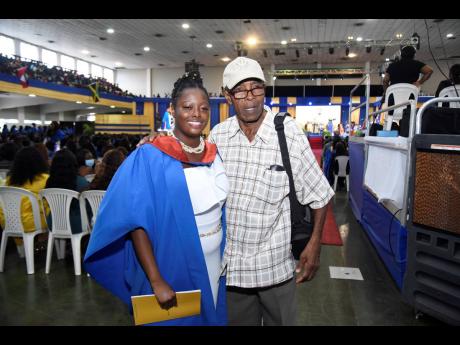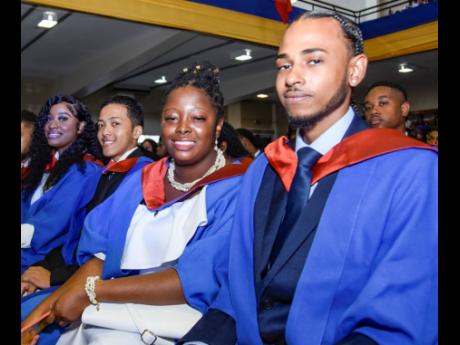Deaf UTech graduate wants more interpreters in universities
When Celine Lobban commenced her studies at the University of Technology, Jamaica, in 2017, she was the only deaf person in her year group in the Faculty of Engineering and Computing.
Lobban knew from the outset that it would have been an uphill task, but she was undaunted.
It was while in third form at Denbigh High School in Clarendon that she completely lost her ability to hear after years of using a hearing aid, so she had already experienced what it was like to be in a classroom and not be able to communicate.
Speaking with The Gleaner through an interpreter at her graduation ceremony on Friday, the 25-year-old said the communication barrier often left her feeling isolated.
“I did feel lonely sometimes because I was the only deaf student in the entire class. I wanted to form connections, I wanted to communicate with them, but it was hard because they could hear and I was deaf,” Lobban said.
Despite the challenge, Lobban chose to focus on her dream of working in the computer science industry. It was a passion ignited by a teacher at the JAD May Pen Unit for the Deaf, to which she was transferred from Denbigh High.
One of her teachers inspired her to attend UTech and ensured she did well academically in order to matriculate.
She also attended the Lister Mair/Gilby School for the Deaf in Kingston to pursue subjects that were not available at the JAD May Pen Unit for the Deaf.
Her academic performance was rewarded with a scholarship from the National Commercial Bank, which funded her university tuition.
For her dad, retired police officer Evon Lobban, the scholarship was the financial miracle he had been praying for.
Since her tuition was taken care of, Evon said he ensured he supported his daughter in whatever other ways she needed.
“At least four times fi di month mi haffi check her mek sure everything in order and mi nuh leave her out, medical everything. Mi have a rapport wid di university people that [if anything], a mi dem call,” he said.
But Evon still had to find an interpreter for his daughter, which would cost him up to $2,500 per hour. But he said it was worth it.
“She bright, man, and all now she nuh fail no semester,” the proud dad declared.
Evon’s dedication to his daughter did not go unnoticed, as Lobban told The Gleaner that he was the “foundation and bedrock” that pushed her to complete her studies.
Lobban said that her degree – a Bachelor of Science in Computer Studies with a Major in Information Systems – has set on the path to create the life she has always wanted.
“I’m so happy. It means now I can finally achieve the things that I set out to achieve. I can get the type of job I want to get,” said Lobban, who is currently teaching information technology at her alma mater, Lister Mair/Gilby School for the Deaf.
“I am a person who has broken many barriers and so I would love for my achievement, especially in this area, to influence other deaf persons to show them that they can have similar success,” she said.
And even as she celebrates this milestone, she is hoping that the next deaf student who decides to attend any university in Jamaica will not be the only one in the class and will benefit from more interpreters.
“Right now, in Jamaica, you don’t have a lot of interpreters available, so when you think about going to university, the first thing that the student think about is ‘who is going to interpret for me?’ and then they also think about the financial aspect of that, in terms of paying the interpreters, because with a deaf person, if they can have that financial support for interpreters, that would be really important,” she said.


